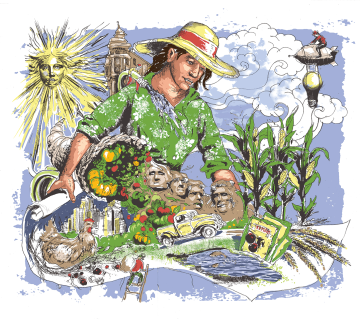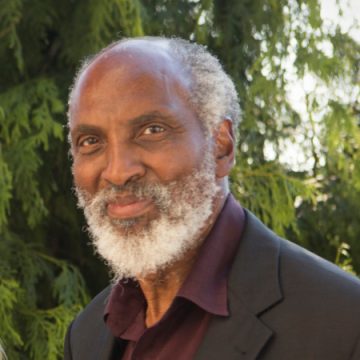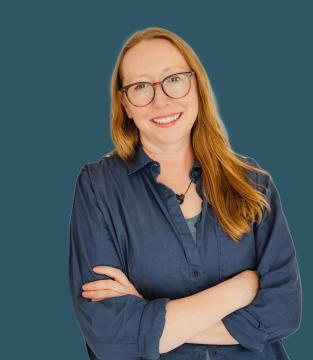Story
Great Green Ideas
Growing a more sustainable food culture has deep roots among a generation of Bush Fellows and nonprofit partners.
DATE
December 22, 2019

By Laura Billings Coleman
Saint Paul’s Lower Town Depot isn’t much to look at. A four-story pile of bricks and broken windows just a stone’s throw from downtown, the abandoned industrial building has long been a magnet for vandals and a backdrop for photographers aimed at capturing gritty urban decay.
The building is an eyesore to many East Siders, but in the eyes of Tracy Sides, a public health Ph.D. and 2013 Bush Fellow, the depot had the potential to be an “Urban Oasis” for local food and the diverse cultural life of Dayton’s Bluff. “This place is sitting right in the middle of the Bruce Vento Nature Sanctuary,” she says. “It’s an amazing location, and it’s practically begging to be revitalized.”
That was the pitch Sides made to the Forever Saint Paul Challenge, a contest sponsored by The Saint Paul Foundation in 2013 that asked residents where they would invest $1 million to make the city more livable. One of 964 ideas submitted to the contest, Sides’ vision was to transform the blighted complex into an urban food hub that could serve as a year-round marketplace for local produce, a commercial kitchen for community entrepreneurs, and a gathering place and gateway connecting this economically challenged neighborhood to the natural beauty of the Mississippi River valley.
“Food is such a fun way to explore diversity and to share the flavors of different cultures,” says Sides, who stepped down from her post at the University of Minnesota’s Center for Infectious Disease Research and Policy to launch herself as a public health entrepreneur in 2012. “Even if you don’t buy into the kumbaya, we’re-all-one view of the world, food can be a great tool for teaching all of the ways we’re connected to and rely on the natural world.”
“Food has always been about relationships, coming together as a family, knowing the farmers in your community, but we’ve reached a point in human history where most of us no longer know enough people who could feed us.” – Kathy Draeger
Sides began her Bush Fellowship just as “Urban Oasis” was chosen as one of three finalists for the Challenge through a community-wide online vote. In September, Sides was waiting for her breakfast order at the Swede Hollow Café where she starts most of her mornings, when she excused herself to answer the call she’d been waiting for. She returned a few minutes later with her arms raised overhead in victory, “and the whole cafe erupted in cheers and lots of hugs,” Sides recalls. “It was just the perfect place to get such great news.”
Winning $1 million toward making her vision a reality has “supercharged” Sides’ Bush Fellowship, filling her calendar with conference calls and planning meetings with the City and community partners such as the Lower Phalen Creek Project. But Sides’ sense of urgency runs deeper.
“Whether you look at our agricultural system, which is producing the kind of food that is making us sick,” says Sides, “or an energy system that’s leading us down the path of continued climate change, or an economic system that is perpetuating significant income inequalities — when you look at what connects all of those things, you can see that one of the best leverage points for change is food.”
The Saving Remnant
“The three-state region the Bush Foundation serves is right in the center of the nation’s bread basket, so it’s probably no surprise that how we grow, distribute and think about food has some very deep roots among Bush Fellows over the years,” says Martha Lee, Bush Fellowship Program manager. “Tracy’s passion for building community and economic opportunities around food is one that’s been shared by many Fellows in the last four decades.”
In fact, not far from the future home of the “Urban Oasis” site is the historic Saint Paul Farmer’s Market, the first public market established in the city back in 1853. When a wave of 1970s- and ‘80s-era urban renewal threatened to destroy the market, the late Ken Taylor (BF’80) led the fight to preserve it. A champion of locally grown food and farmers who went on to form the Minnesota Food Association in 1983, Taylor was a pioneer in the community-supported agriculture movement, credited with convening conversations between farmers and food company executives about shifting to more sustainable agricultural practices. “I believe that the food we eat carries within it, in some form or another, the values that dominate the system which produced it,” Taylor wrote before he died in 1995. “Our food is a good measure of how we do business as a society — what there is to like and what needs to change.”
Fellows like Taylor helped to give the Foundation advance warning of many of the challenges familiar to farmers and consumers today — from the economic collapse of small farming towns, to the rise of genetically modified foods, to the advance of “food deserts” with few fresh and healthy food options in the Twin Cities’ urban core.
In 2002, the Foundation responded to those and other warnings by creating an “ecological health” priority that included grant support for organizations driving a variety of environmental issues, including sustainable food development. Former Senior Program Officer Jane Kretzmann, who created and led the program area for the Foundation, says that grant requests that challenged conventional growing practices or accepted wisdom were often difficult for the Foundation’s Board of Directors to come to consensus on “because one of the questions we struggled with was, were these projects on the fringe, or were they leading edge? We worked hard to stay as close to the science as we could.”
The “ecohealth” funding program also informed the Bush Fellowship selection process. “The Foundation was always looking for levers of change, and the Bush Fellowships really helped to invest in individuals who were in the best position to make a difference,” says Kretzmann, now a senior fellow at the University of Minnesota’s College of Education and Human Development.
While the ecohealth priority ended in 2008, many organizations that led the early charge on sustainable food and farming have been successful applicants to the Foundation’s Community Innovation Grant program launched in 2013.
For instance, Renewing the Countryside II received a $100,000 Community Innovation grant in 2013 for its work making farmland across Minnesota more accessible to new and young farmers, while building partnerships between food co-ops and growers. Northern Plains Sustainable Agriculture in LaMoure, North Dakota, became one of nine nonprofits to win the inaugural Bush Prize for Community Innovation in 2013. The Bush Prize gave a $76,000 boost to the organization’s Farm Breeding Club, a project aimed at ensuring the nation’s food security by increasing crop diversity, and releasing more seed into the public domain.
“Sustainable agriculture is one of the best ways we can get after environmental health, because whatever is happening in our farms and wild areas is what’s happening to everyone,” says Frank Kutka, (BF’00) who co-directs the Farm Breeding Club, one of the first organizations of its kind in North America. The organization encourages members to cultivate and save the seeds from plants that produce the best yields and flavor from their own farms, helping to preserve heritage varieties lost in the spread of large-scale farming.
One of the Club’s early leaders and biggest proponents is Theresa Podoll (BF’07), who used her Fellowship to pursue a graduate degree in community development, skills that have helped her step into national leadership roles with such organizations as the Family Farmers Seed Collective and the Organic Farming Research Foundation. Now a nationally recognized voice on the value of seed stewardship, Podoll says “the gift the Fellowship gave me was immersing me in how to talk about these things I care about so much from a community perspective.”
Investing in grassroots leaders like Kutka and Podoll is one of the ways the Bush Foundation “got ahead of the curve” on many of the country’s concerns about sustainable agriculture, says Bush Fellow Kathy Draeger (’99) who went on to serve as a consultant for the “ecohealth” grant priority. “Food has always been about relationships, coming together as a family, knowing the farmers in your community, but we’ve reached a point in human history where most of us no longer know enough people who could feed us,” says Draeger, who now serves as statewide director of the University of Minnesota’s Regional Partnerships. “Where I live in Big Stone County, the number of dairy farmers has dropped from 400 in 1960, to about 40 in 1980, and now in 2014 there is just one. Within just one generation, we have demolished all of that generational knowledge.”
“Not to be too melodramatic, but I think people like Frank Kutka and Theresa Podoll are like ‘the saving remnant,’ from the Book of Isaiah,” Draeger says — community leaders with the knowledge necessary to “fan the flames forward so that when we’re trying to solve the world’s problems, we don’t have to keep starting from scratch.”
Breaking Bread
But not every Bush Fellow with a great, green idea is a grower like Kutka and Podoll. Heidi De Mars (’13) got her start as a grocery shopper.
Frustrated when she couldn’t find the fresh local produce she wanted to feed her kids after her family’s move to Bismarck, she joined a local CSA. There she connected with family farmers just as frustrated by growing food that, without good channels for distribution, often goes to waste.
“I started thinking I can’t be the only one around here who wants better access to good food,” says De Mars, who organized a truck stop meet-and-greet between two dozen local growers and consumers who began forming blue-sky plans about creating what would be Bismarck’s first food co-op. “I’m not trained to do this kind of thing, but it’s what I care about,” says De Mars, who began reading up on other Bush Fellows interested in sustainable food systems before becoming a Fellow in 2013. “I was floored by how many other people are looking at these questions in their own communities. I thought, ‘These are my people!’”
“Food is such a fun way to explore diversity and to share the flavors of different cultures.” – Tracy Sides
In fact, the last few years have produced a bumper crop of Bush Fellows exploring the ways that food can promote and preserve communities. Minnesotans Noreen Thomas of Georgetown and Brent Olson of Clinton both began Fellowships in 2012 aimed at converting community assets into hubs for food distribution and economic growth. Thomas hopes to revive a licensed kitchen in the Georgetown City Hall as a center for community and even commercial food processing, while Olson opened “The Inadvertent Café” on Clinton’s main street, offering an adjoining annex to local food producers interested in bringing fresh products to the local market.
Figuring out how the next generation of farmers can work the land sustainably while making a living wage has been a question that Olson, a writer, has been exploring as part of his Fellowship. “For a lot of local foods people, there’s this purity element,” with producers who seem unconcerned about making a profit, Olson says. “But I think if you’re raising local food you ought to be able to make a living at it, too, and send your kids to college and go to Cancun on your 25th anniversary.”
In Nisswa, Minnesota, farmer and Bush Fellow Arlene Jones (’13) is also trying to create fresh markets for local farmers by expanding a farm-to-school produce program. Starting with 1,000 pounds of produce she grew on her farm and delivered to salad bars in the Brainerd school district, her local food distribution plan now brings garden-fresh produce grown by 40 local farmers to three school systems and two hospital systems. “My goal is to provide fair and equitable markets to all farmers,” including the growing number of Latino farmers in central Minnesota and the Amish community in Todd County, Jones says.
In Hugo, Minnesota, Diane Wilson (BF’13) is working to collect and cultivate indigenous seeds as part of her work as executive director of the working farm/nonprofit Dream of Wild Health. In Milan, Minnesota, greenhouse grower Chuck Waibel earned a 2013 Fellowship aimed at relieving rural food deserts with winter-grown produce. Waibel died of colon cancer just weeks after his Fellowship began, but his wife and greenhouse partner Carol Ford will carry on his work, establishing a greenhouse growers network in west central Minnesota with a memorial grant the Foundation made in January to the Regional Sustainable Development Partnership at the University of Minnesota.
With so many current Fellows exploring food hubs, cooperative enterprise and agricultural systems, Bush Fellowship Program Manager Martha Lee has made a point of encouraging this cohort to connect. “Martha keeps saying, ‘you all need to know each other,’” says Bush Fellow Leslie Watson (’13), a board member of the Northeast (Minneapolis) Investment Co-op, who is organizing a bread-breaking brainstorming session later this spring.
“One thing that’s exciting about seeing so many Fellows looking critically at food systems is that, as their own projects and passions suggest, there’s no one right solution for every community,” says Lars Leafblad, the Foundation’s director of leadership and engagement. “But having this much brain power and leadership capacity applied to these questions about creating sustainable agriculture and greener channels for distribution means that our region is positioned to benefit from the innovative strategies these Fellows are exploring.”
Jones says that knowing other Bush Fellows are committed to the same questions has been inspiring and instructive. For instance, she and Sides are looking at how to create thriving food hubs from two different directions. “She’s asking how do you create the structure to utilize the funds, and my position is how do I incrementally build the infrastructure for a food hub without funding?” says Jones, who adds, “It’s not my generation that’s going to drive this systemic change in our food culture, but it’s going to be people like Heidi De Mars and the people who come after her who are going to make the difference — that next generation willing to change their spending habits.”
Sides agrees that having so many food-minded Bush Fellows around the region has been energizing, especially as her plans for an “Urban Oasis” move forward in the coming year. “It’s an idea whose time has come, and it’s an idea that builds on the work of a lot of Bush Fellows before me,” says Sides. “And I think it’s about more than just food — it’s about recognizing that what we’re doing as a human species is not sustainable, and that it’s time to cultivate a more generative relationship with the natural world.”
Sides laughs. “That’s my big-picture speech. But on the small scale, there is a wonderful human benefit of sharing food with your neighbors, having the skills to cook food you grew yourself and keeping more of your money in the local economy. I really believe local food is magic.”
Continue reading
-

News
Power of Bridging Event
Mark your calendars for a special community event with john a. powell! Thanks to our friends at MPR News, we'll be hosting john at the Fitzgerald Theater on December 2 and hope you can join us!
-

News
Celebrating the 2025 Bush Prize honorees
Learn more about the 2025 Bush Prize honorees who are helping to make our region better for everyone!
-

News
Welcome to new Bush staff members
We are celebrating some new Bush colleagues and hope you get to meet them soon!